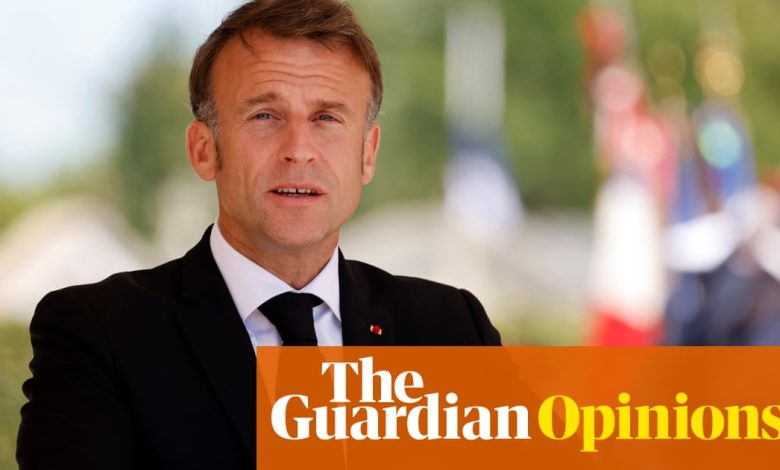The Guardian view on Macron’s gamble: playing with political fire | Editorial

Ahead of Sunday’s European election results, attention was understandably focused on the impact of a potential far-right surge on the balance of power in Brussels institutions. In this case, the pan-European center Held, almost, as the more moderate conservative parties usually enjoy a good night. But that wasn’t even the main headline of the night.
Emmanuel Macron’s shocking decision yes call early legislative elections, after a a humiliating defeat in the hands of Marine Le Pen’s National Unity (RN) party, is a gamble of the highest order, taken from a position of weakness. Even by the standards of a president who created his own movement to break down the traditional center-left and center-right is a surprisingly risky move. In an address on Sunday evening, Mr Macron told the nation it was necessary to “clarify” a result in which the far-right won a combined 40% of the vote. That clarification, when it comes on July 7, may or may not be welcome.
Mr Macron will be hoping to call off the bluff of a significant section of the electorate, reckoning that voters who cast a protest vote at the weekend will have second thoughts when faced with the possibility that Ms Le Pen’s protégé, Jordan Bardella, to become prime minister next month. Alternatively, he may believe that a period of “coexistence” with an RN-led government would usefully demonstrate the radical right’s unfitness for office, aiming its guns ahead of the climactic presidential contest in 2027. Lacking a majority in the national assembly, Mr Macron may also seek to unite the moderate parties behind him around one leading politician described like “five minutes to midnight”. The two-round voting system for the general election – and the higher turnout – at least means Ms Le Pen’s candidates will have to fight harder to win than they did at the weekend.
But nobody really knows what is happening now. As David Cameron discovered after promising a Brexit referendum, following the star European results for Nigel Farage’s Ukip in 2014, bold gambits can deliver many unpleasant surprises. The most likely outcome of Mr Macron’s roll of the dice appears to be an increased RN presence in a fractured, fragmented and paralyzed parliament. Such a stalemate would certainly be grist for Ms Le Pen ahead of 2027. It would also be destabilizing for the rest of Europe after elections in which far-right parties topped the polls in Italy and Austria and the AfD finished second in Germany despite being mired in scandals for months.
Most importantly, the main pro-EU parties still have a clear majority in the European Parliament and will control the horse-trading for appointments to the new European Commission. But polls over the weekend confirmed that Eurosceptic nationalist movements, once confined to the fringes, are normalizing and growing in influence. Giorgia Meloni’s Brothers of Italy party, the successor to the post-war neo-fascist movements, has increased its share of the vote compared to its winning results in the 2022 general election. This performance consolidate Ms Meloni’s position as one of Brussels’ leading policy brokers. Depressingly, Europe’s rightward lurch on issues such as the green transition and immigration looks set to continue.
Next month, however, all eyes will be on France. In the context of Vladimir Putin’s war in Ukraine and wider geopolitical instability, Mr Macron did it was a vocal and welcome advocate for a stronger, united and confident Europe. Now he has chosen to face Ms Le Pen, who has a history of sympathizing with Putin and longs to destroy the European Union from within, on the heels of the biggest victory of her political career. A fateful competition is looming not only for France, but for the EU as a whole.




